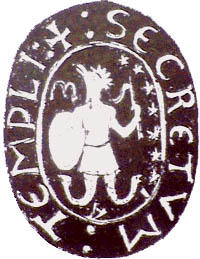Basilides: A Secret Tradition
 Basilides (circa 117-138) was an early Christian religious teacher who lived in Alexandria, Egypt. His followers, the Basilideans, formed a Gnostic sect. Very little is known with certainty about the teachings of Basilides. An account of his purported heresy is contained in the work Adversus Haereses ("Against Heresies") by Irenaeus of Lyons, but it is impossible to determine how faithful Irenaeus's hostile reading is to the views actually held by Basilides.
Basilides (circa 117-138) was an early Christian religious teacher who lived in Alexandria, Egypt. His followers, the Basilideans, formed a Gnostic sect. Very little is known with certainty about the teachings of Basilides. An account of his purported heresy is contained in the work Adversus Haereses ("Against Heresies") by Irenaeus of Lyons, but it is impossible to determine how faithful Irenaeus's hostile reading is to the views actually held by Basilides.Influence: Twentieth-century psychoanalyst Carl Jung wrote his Seven Sermons to the Dead and attributed them to Basilides. The Argentine writer Jorge Luis Borges was interested in Irenaeus' account of Basilides' Gnostic doctrine and wrote an essay on the subject: "A Vindication of the False Basilides" (1932). Basilides is also mentioned in Borges's short story "Three Versions of Judas" (1944), which opens with the striking passage "In Asia Minor or in Alexandria, in the second century of our faith, when Basilides published that the Cosmos was a reckless or evil improvisation by deficient angels... "
The Basilideans were a Gnostic sect founded by Basilides of Alexandria in the 2nd century.
Basilides claimed to have been taught his doctrines by Glaucus, a disciple of St Peter. The sect had three grades – material, intellectual and spiritual – and possessed two allegorical statues, male and female. The sect's doctrines were very similar to those of the Ophites and also had similarities to Jewish Kabbalism. Members wore stones or gems cut in various symbolic forms, such as the heads of fowl and serpents. The Basilideans worshipped a supreme god called Abraxas (or Abracax) and claimed that Jesus Christ was only a phantom sent to earth by him.
Basilides was "an Alexandrian scholar writing between A.D. 120 and 130. Basilides was conversant with both Hebrew scriptures and Christian Gospels. He was also steeped in Egyptian and Hellenistic thought."
- Baigent, Leigh & Lincoln, The Holy Blood and the Holy Grail
"Clement of Alexandria, a Christian theologian of the 3rd century AD, wrote that Basilides claimed to have received a secret tradition--on which he apparently based his gnosis, or esoteric knowledge--from Glaucias, an interpreter of the Apostle Peter. In addition to psalms and odes, Basilides wrote commentaries on the Gospels and also compiled a "gospel" for his own sect; only fragments of these writings have been preserved. Contradictory accounts of Basilides' theology have been provided by Clement, as well as by the theologians Hippolytus of Rome and Saint Irenaeus. While interpreters cite elements of Neoplatonism, the New Testament, and other Gnostic systems, description of the Basilidian system of belief remains incomplete."
- Encyclopaedia Britannica
"Two individuals, the Syrian Starnilus, or Saturnilus, and the Egyptian Basilides, active during the first quarter of the second century, adapted the idea of the Christ - not the history of the man Jesus - to the gnostic panorama of the universe. From John 1:18, Saturnilus took the assertion that the father is unseen (and therefore unknown); he created a world of angels and archangels, principalities and powers (cf. Eph. 1:21, 6:12), seven of which made the world and man. Man was originally a creeping thing, until the supreme power breathed into some the 'spark of life'. Mankind is then divided into two races, a good, spiritual race, and an evil, earthy race (cf. the references to the children of light and the children of this world, e.g. Eph. 5:8). The Father sent his only begotten, the incorporeal Christ, to destroy the evil race and save those who have the spark of life; he was a man in appearance only."
- Harold O.J. Brown, Heresies
"The lawless and hostile Archons who rule this world can be vanquished. It is Christ who is the heavenly redeemer, the Pleroma, the light from the Father, the Illuminator, and like Christ, the disciples also are to become 'illuminators in the midst of dead men.'"
- The Letter of Peter to Philip
The Aeons
"What relationship can the absolutely pure, spiritual Father have with the corruptible world of material reality? Basilides taught that the Father had nothing to do with it. The Father is capable only of spiritual activity, by it Nous ('Mind') proceeds from him. This process is called emanation and has nothing in common with physical generation. From the Nous comes the Logos ('Word'). Gnosticism thus took over a fundamental biblical concept, but reduced it in stature from the absolute rank it holds in John 1 to that of a link in a descending sequence of aeons. From the highest aeons process Phronesis ('Prudence'), Sophia ('Wisdom'), and Dynamis ('Power'). Wisdom and Power are attracted to one another in a degrading passion; out of their desire proceed angelic beings, base by comparison with the first Aeons. These angels create the first heaven; other angels arise from them and create a second, and so on until three hundred and sixty-five heavens have been created. The ruler of the angels who made the lowest heaven is the God of the Jews."
- Harold O.J. Brown, Heresies
"The God of the Jews produced the Law and sent the Prophets, who thus appear clothed with a measure of authority, but of a subordinate and malign kind. God the Father sent Christ, the firstborn aeon known as Nous (not Logos), to free the souls of the spiritual from the power of the base creative angels who hold them prison in vile physical bodies. According to Basilides, this Christ was a man only in appearance; Simon of Cyrene, whom the Romans pressed into service to help Jesus carry his Cross, was crucified in his place, while the Nous returned to the Father."
- Harold O.J. Brown, Heresies
"Yes, they saw me; they punished me. It was another, their father who drank the gall and the vinegar; it was not I. They struck me with the reed; it was another, Simon, who bore the cross on his shoulder. It was another upon whom they placed the crown of thorns. But I was rejoicing in the height over all the wealth of the archons and the offspring of their error, of their empty glory. And I was laughing at their ignorance."
- The Second Treatise of the Great Seth
"There is no doubt that the Second Treatise of the Great Seth is a work that is both Christian and Gnostic.... Knowledge is the means of salvation. The God of this world is evil and ignorant, and can be identified with the God of the Old Testament; in addition all his minions are mere counterfeits and laughingstocks."
- Joseph A. Gibbons in The Nag Hammadi Library
"The myth ends in cosmic annihilation when those who remain below will neither be saved nor know of their need for salvation."
- John Ferguson, An Illustrated Encyclopaedia of Mysticism and the Mystery Religions


0 Comments:
Post a Comment
<< Home